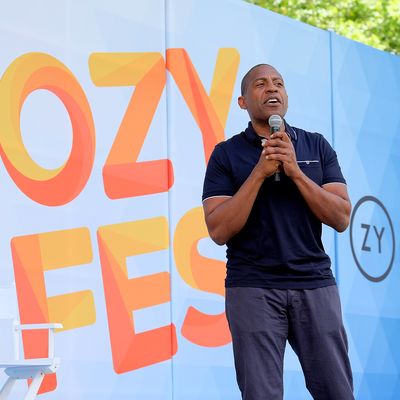
The quasi–media company Ozy is shutting down less than a week after a revelation that was the business equivalent of a teenager getting caught on the phone with a teacher trying to pass off their friend as their parent. On Sunday, New York Times media columnist Ben Smith reported a strange Zoom call last February between Ozy CEO Carlos Watson and the asset-management division of Goldman Sachs. After the bank requested the previous month to speak with someone at YouTube to confirm a few things about video traffic, they were given an email address for a YouTube executive named Alex Piper to schedule a conference call with everyone. On the video chat in February, as Watson tried to convince Goldman to throw his digital media company $40 million to make more celebrity Q&A videos, he called in Piper — but only after Piper said the group should switch from Zoom to a phone call. When a Goldman employee reached out to Piper after the exchange, it became clear why the person on the call wanted to pivot from video. Piper was actually being impersonated by Ozy co-founder and chief operating officer Samir Rao, who gave the bank the bunk email address in the first place.
The report immediately sunk the events-and-editorial company into crisis-management mode, as executives dealt with a swirl of negative attention. Though Ozy board chairman (and Milwaukee Bucks co-owner) Marc Lasry told the Times that “we fully support” how the “unfortunate one-time event” was handled internally, others were less generous, considering that the company basically ignored the mess from when it happened in February until it was reported this week. Goldman Sachs didn’t take further action, but Google’s security team found that a crime may have been committed and reportedly alerted the FBI. “You’re just not going to get an easier securities-fraud case than that,” wrote Goldman alum and Bloomberg Opinion columnist Matt Levine.
Up until Tuesday, the Ozy board felt content without instituting a formal investigation of a big investor pitch in which their COO reportedly altered his voice and provided a fake email to a potential investor because Rao was having a “mental health crisis,” according to the Times. (If securities- or wire-fraud charges were to come about, it’s unlikely that the Feds would accept this adoption of therapeutic language as an alibi for trying to deceive investors.) Only after the report became public did the board of directors formally ask Samir Rao to take a leave of absence amid an investigation — conducted by the law firm Paul, Weiss — into the “company’s business activities.”
Amid the fallout, Ozy faced increased scrutiny for its opaque treatment of web traffic since its founding in 2013. While BuzzFeed News reported in 2017 that the company had been buying traffic by getting its articles to pop up behind a reader’s browser, several reporters noted that Ozy has some questionable engagement numbers, like social-media accounts with hundreds of thousands of followers that only get a handful of likes or comments with each post. Then there’s the practice of attributing glowing quotes about Ozy talent to other publications — “best interviewer on TV” and “Anderson Cooper meets Oprah” — that actually came from the company itself. On Thursday, the Times reported on another, less glaring act of deception, in which the network told producers, writers, and guests of The Carlos Watson Show that the talk program would be on A&E, when a distribution deal was never secured; the show was ultimately hosted on Ozy’s site and uploaded to YouTube. Sharon Osbourne also said that Watson’s claim on-air on CNBC that she and her husband Ozzy were investors in the company was false. As a result of the apparent inflation, some advertising agencies reportedly started poking around to determine if Ozy delivered on the engagement they were promised. Meanwhile, Watson stepped down from his hosting duties for the Documentary Emmy Awards on Wednesday night.
Others began distancing themselves from the company. Axios reported on Tuesday that one of Ozy’s earliest investors, Ron Conway, surrendered his shares. On Wednesday, longtime BBC News anchor Katty Kay, who only recently started as senior editor and executive producer at Ozy, resigned from her post; by Thursday, Ozy chairman Marc Lasry also resigned, saying “I believe that going forward Ozy requires experience in areas like crisis management and investigations, where I do not have particular expertise.”
Then, on Friday evening, the company’s board announced that it was shutting the company down entirely:
With all this trouble having proved a fatal wound for the company’s reputation, in hindsight it may not have been best to name it after “Ozymandias,” the 1818 poem by Percy Shelley about the statue of a great king whose legacy has been lost to time. (Ozy’s website says they read the work as “a call to think big while remaining humble.”) Perhaps a reference to a line in the poem may have been more appropriate, specifically the penultimate one involving a “colossal Wreck.”
This post has been updated.






























